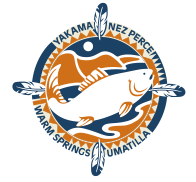
Sunset over the Snake River Canyon. This stretch of river was the furthest upstream salmon could migrate up the Snake River as Shoshone Falls was a natural passage barrier. Today, salmon no longer return to this area as Hells Canyon Dam has no fish passage.
Around the world, communities are pulling together to protect life forms that have flourished for thousands of years but are now severely threatened from human-induced environmental impacts. Columbia Basin salmon are among those vulnerable species in crisis. Working together, there’s still time to act to save salmon and other keystone animals threatened by climate change and resource scarcity. This Earth Day, we invite you to stand with tribes and other natural resource warriors in advocating for comprehensive solutions to climate change issues.
Earlier this week at the United Nations Permanent Forum on Indigenous Issues, Francisco Cali Tzay, a Mayan Cakchiquel from Guatemala remarked, “As we are all aware, Indigenous peoples have least contributed to the problems of climate change nonetheless, due to their interdependence with their vital environment in their ecosystems, they suffer at its worst effects.”
Tribal communities have acutely suffered from steep declines in ceremonial First Foods and other natural resources their cultures rely on. Climate impacts, habitat loss, overharvest, and the hydrosystem have changed the ecosystem at the expense of salmon and the Native peoples who have depended upon them since time immemorial. An estimated 16 to 20 million salmon once returned annually to the Columbia River and its tributaries. Today seven Columbia Basin stocks are listed under the Endangered Species Act, many upper Columbia stocks are extinct from dams without fish passage, and many tributaries in the Snake River basin are already at the quasi-extinction threshold of fewer than 50 adult salmon returning to spawn. Without significant changes, our salmon, along with countless other species that depend on them, will disappear.
Scientists who work for CRITFC and the four Columbia River treaty tribes agree, we need a durable, long-term strategy to restore Columbia Basin salmon and other native fish populations to healthy and abundant levels. This already difficult task will become even more challenging as climate impacts continue to alter the ecosystem that salmon rely on. Federal, state, and tribal governments must work together and commit to a comprehensive package of actions to save our salmon. Among these actions are:
- Prevent new and reduce ongoing damage to Columbia River basin natural resources by analyzing and accounting for the interdependencies of natural and built aquaculture systems – including the Northwest’s energy system. The tribes’ holistic salmon restoration plan Wy-Kan-Ush-Mi Wa-Kish-Wit recommends actions throughout the salmon’s lifecycle to accomplish this.
- Meeting our green energy and infrastructure resiliency goals in ways that support fisheries restoration goals, honors treaty and trust obligations to tribes, and affords economic opportunities to tribal and other marginalized communities. The recently released Tribal Energy Vision has a number of recommendations on how to carry out the transition to clean energy in a way that doesn’t harm salmon and tribal cultural resources.
- Completing roughly two billion dollars in backlogged habitat, hatchery, and hydrosystem projects already identified as necessary or regionally recommended.
- Putting dam removal on the table as soon as practicable.
- Providing significantly increased resources for mitigation actions such as improved planning and zoning regulations, levee removal, and new construction bans in floodplains to ensure fish health and resiliency in the face of increased environmental pressures.
- Transitioning BPA out of the fish mitigation business and putting expert tribal and state fisheries co-managers in charge of restoration work.
Recently, the United Nations Intergovernmental Panel on Climate Change (IPCC) issued its 2023 synthesis report. It warns that the effects of climate change will continue to intensify, and swift and drastic action is needed to avoid the worst impacts on our planet. While many of the actions salmon and the earth need are big policy changes, there are smaller individual changes that we can all make to help not only salmon, but the whole ecosystem.
- Conserve electricity by only using what you need
- Reduce your reliance on fossil fuels
- Grow a garden or buy food from local vendors
- Limit waste and reducing the amount of things you buy
- When you do need something, choose products from companies who use resources responsibly and are committed to cutting their gas emissions and waste
- Before throwing something away, consider repurposing or recycling
- Plant a native tree or plant. They are adapted to the amount of water from your area and also benefit pollinators and other wildlife
- Conserve water usage
- Speak up and get others to join in taking action
- Ask yourself what it means to be a true resident of this place; commit to spending more time outdoors enjoying, learning about, and connecting with the land you call home
A fundamental teaching from the Native peoples of this continent is to make decisions with future generations in mind; this means that the decisions we make today should result in a sustainable world for our grandchildren’s grandchildren. Another is that it is humanity’s duty to be the voice for the earth and everything on it. Today on Earth Day, we encourage everyone to commit to learning from this tribal wisdom. With these teachings in mind, we can work together to stop harming the earth and start focusing on the actions needed to carry out the difficult job of undoing the damage that has already been caused.
